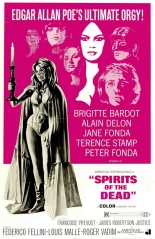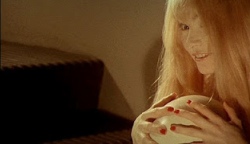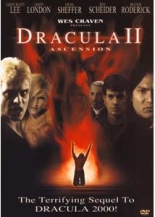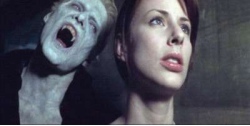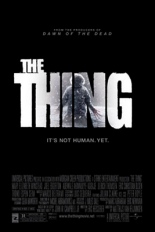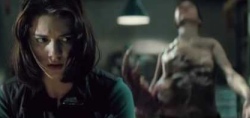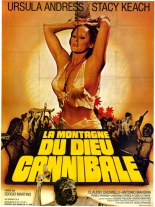
 Judging from the opening credits of this juicy helping of Italian sleaze, you’d think this would be called When Animals Attack the Shit Out of One Another, as the film introduces us to the laws of the jungle via real-life, mondo-style footage of how the food chain works. These bits are sprinkled throughout the film at random moments as well, allowing you the full-color spectacle of, say, a snake swallowing a monkey whole.
Judging from the opening credits of this juicy helping of Italian sleaze, you’d think this would be called When Animals Attack the Shit Out of One Another, as the film introduces us to the laws of the jungle via real-life, mondo-style footage of how the food chain works. These bits are sprinkled throughout the film at random moments as well, allowing you the full-color spectacle of, say, a snake swallowing a monkey whole.
But there’s a story here, too, albeit a sketchy one. The Mountain of the Cannibal God stars Ursula Andress as Susan, a woman in search of her husband, unheard of for months after his jungle expedition. She and her brother hire Prof. Foster (Stacy Keach, who looks coked out of his mind) to take them into said jungle to locate him, although few doubt her spouse remains alive.
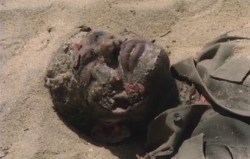 The group encounters poisonous spiders, venomous snakes, arm-hungry crocodiles and spike-laden booby traps. Eventually, they come across natives wearing freaky masks, prompting an admission from Foster that he has been partaken of their unusual rituals before: “You never forget the taste of human flesh!” he screams.
The group encounters poisonous spiders, venomous snakes, arm-hungry crocodiles and spike-laden booby traps. Eventually, they come across natives wearing freaky masks, prompting an admission from Foster that he has been partaken of their unusual rituals before: “You never forget the taste of human flesh!” he screams.
Eventually, Susan does find her husband … dead and partially liquified, with a Geiger counter sticking out of his tum-tum. The cannibals strip her naked, paint her orange and tie her up. One cannibal tries to rape her, so the lead cannibal cuts off the eager man’s penis. In more deviant footage, female cannibals masturbate and a man fucks a pig. I leave it to you to determine whether that’s a recommendation or a warning. —Rod Lott



